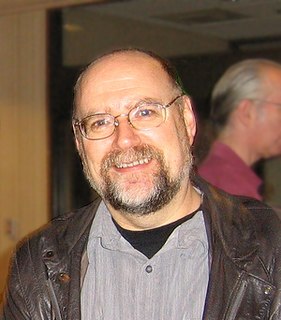A Quote by Robert Charles Wilson
From this new point of view, the universe I had inhabited became an object I could perceive in its entirety. It was a hypersphere embedded in a cloud of alternative states - the sum of all possible quantum trajectories from the big bang to the decay of matter. "Reality" - history as we had known or inferred it - was only the most likely of these possible trajectories. There were countless others, real in a different sense: a vast but finite set of paths not taken, a ghostly forest of quantum alternatives, the shores of an unknown sea.
Quote Topics
Alternative
Alternatives
Bang
Became
Big
Big Bang
Cloud
Could
Countless
Decay
Different
Embedded
Entirety
Finite
Forest
Had
History
Known
Likely
Matter
Most
New
Object
Only
Others
Paths
Perceive
Point
Point Of View
Possible
Quantum
Real
Reality
Sea
Sense
Set
States
Sum
Taken
Universe
Unknown
Vast
View
Were
Related Quotes
You can't change your life. This mode in literature goes against the more middle-brown mode, which is about shaping your destiny, changing it. You can't change it, you just become passive in front of it. Even if we live in a godless universe, there are paths set, there are trajectories, like bumper cars just pulling those trajectories, colliding.
Quantum physics presents a new and exciting worldview that challenges old concepts, such as deterministic trajectories of motion and causal continuity. If initial conditions do not forever determine an object's motion, if instead, every time we observe, there is a new beginning, then the world is creative at the base level.
We couldn't build quantum computers unless the universe were quantum and computing. We can build such machines because the universe is storing and processing information in the quantum realm. When we build quantum computers, we're hijacking that underlying computation in order to make it do things we want: little and/or/not calculations. We're hacking into the universe.
In quantum mechanics there is A causing B. The equations do not stand outside that usual paradigm of physics. The real issue is that the kinds of things you predict in quantum mechanics are different from the kinds of things you predict using general relativity. Quantum mechanics, that big, new, spectacular remarkable idea is that you only predict probabilities, the likelihood of one outcome or another. That's the new idea.
I favour an interpretation of quantum mechanics (the 'Everett interpretation') according to which reality branches in any chancy quantum situation. On this view, Schrödinger's set-up will give rise to in two future branches of reality, one with a live cat, and one with a dead cat - and the talk of '50% chances' just indicates that the two branches are both equally real futures of the cat that originally entered the box.
I saw that everything, all paths I had been following, all steps I had taken, were leading back to a single point - namely, to the mid-point. It became increasingly plain to me that the mandala is the center. It is the exponent of all paths. It is the path to the center, to individuation. I knew that in finding the mandala as an expression of the self I had attained what was for me the ultimate.
One can imagine that God created the universe at literally any time in the past. On the other hand, if the universe is expanding, there may be physical reasons why there had to be a beginning. One could imagine that God created the universe at the instant of the big bang, or even afterwards in just such a way as to make it look as though there had been a big bang, but it would be meaningless to suppose that it was created before the big bang. An expanding universe does not preclude a creator, but it does place limits on when he might have carried out his job!































